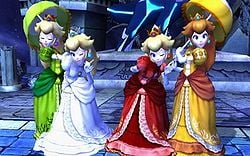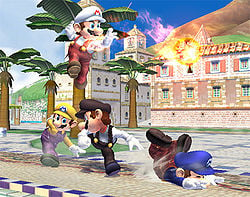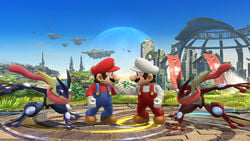Alternate costume: Difference between revisions
| Line 20: | Line 20: | ||
''[[Brawl]]'' includes a significantly larger number of alternate costumes than its predecessors, with the average number of colour changes per character being roughly 4.7 in the original ''[[Super Smash Bros.]]'' and ''[[Melee]]'', and 6.0 in ''Brawl''. [[Pikachu]] is the only character to appear in the first three games with only four colour options, and is the only character in ''Brawl'' with only four colour options. Wario is currently the only character in any game in the series, to have more than six palette swaps. Wario is special in that the player may choose colour variations of either his biker costume from the ''WarioWare'' series, or his classic overalls. Both costumes have six palette swaps, making for a total of twelve choices. Additionally, the red, green and blue variations of both the biker costume and the overalls may be used in team battles, and before the fourth installment, [[Wario]] was the only character with two colour choices when on a team. | ''[[Brawl]]'' includes a significantly larger number of alternate costumes than its predecessors, with the average number of colour changes per character being roughly 4.7 in the original ''[[Super Smash Bros.]]'' and ''[[Melee]]'', and 6.0 in ''Brawl''. [[Pikachu]] is the only character to appear in the first three games with only four colour options, and is the only character in ''Brawl'' with only four colour options. Wario is currently the only character in any game in the series, to have more than six palette swaps. Wario is special in that the player may choose colour variations of either his biker costume from the ''WarioWare'' series, or his classic overalls. Both costumes have six palette swaps, making for a total of twelve choices. Additionally, the red, green and blue variations of both the biker costume and the overalls may be used in team battles, and before the fourth installment, [[Wario]] was the only character with two colour choices when on a team. | ||
''[[Super Smash Bros. 4]]'' expands on ''Brawl''{{'}}s range of choices by introducing Male and Female variants for the [[Wii Fit Trainer]], [[Villager]], [[Robin]], and [[Mii Fighter]] characters. Despite the fact that the Villager has different costumes for each of the genders and the Mii Fighter has fully customizable features, the Wii Fit Trainer has been shown to have similar colour variations for both the male and female genders, thus making the Wii Fit Trainer another character to have more than one colour choice when on a team. In the fourth installment, each character has at least eight different palette swaps or alternate costumes, giving players the largest range of choices in a ''Smash Bros.'' title. [[Little Mac]] is the only character with more than eight palettes, possessing eight additional palette from his wireframe version from the arcade version of ''Punch-Out!!'' Little Mac has an alternate costume where he wears his pink hoodie from the training montages in the ''Punch-Out!! series'', and [[Shulk]] has an alternate costume based on his swimsuit armor set from ''Xenoblade Chronicles''. [[Olimar]] and [[Bowser Jr.]] have palettes that change the character entirely, | ''[[Super Smash Bros. 4]]'' expands on ''Brawl''{{'}}s range of choices by introducing Male and Female variants for the [[Wii Fit Trainer]], [[Villager]], [[Robin]], and [[Mii Fighter]] characters. Despite the fact that the Villager has different costumes for each of the genders and the Mii Fighter has fully customizable features, the Wii Fit Trainer has been shown to have similar colour variations for both the male and female genders, thus making the Wii Fit Trainer another character to have more than one colour choice when on a team. In the fourth installment, each character has at least eight different palette swaps or alternate costumes, giving players the largest range of choices in a ''Smash Bros.'' title. [[Little Mac]] is the only character with more than eight palettes, possessing eight additional palette from his wireframe version from the arcade version of ''Punch-Out!!'' Little Mac has an alternate costume where he wears his pink hoodie from the training montages in the ''Punch-Out!! series'', and [[Shulk]] has an alternate costume based on his swimsuit armor set from ''Xenoblade Chronicles''. [[Olimar]] and [[Bowser Jr.]] have palettes that change the character entirely. Four of Olimar's palettes changes the character to Alph, and all seven of Bowser Jr.'s alternate palettes replaces him with one of the seven Koopalings. While they have their own unique announcer sounds, crowd chants, and voices, their gameplay is completely identical to their defaults. [[Lucina]] from ''{{s|fireemblemwiki|Fire Emblem: Awakening}}'' was originally planned to be an alternate costume for [[Marth]] in a similar vein, but was made into a separate character. | ||
<!-- | <!-- | ||
Average number of colour choices per character: | Average number of colour choices per character: | ||
Revision as of 11:10, September 21, 2014

In the Super Smash Bros. series, each character has a different number of palette swaps (also colour changes) - alternate costumes that they may wear, usually either for the purpose of distinguishing themselves from other players who are using the same character or for the purpose of distinguishing allies from opponents in team battles, or just for the purpose of choosing the player's favorite palette swap. These different costumes usually alter only the character's colour scheme in a true palette swap fashion, but some, namely Pikachu, Pichu, Jigglypuff, and Sonic, incorporate modeled accessories.
Name
The term "palette swap" normally refers to sprite-based games, where changing the "palette" of a sprite replaces the set of colours used to build the sprite with a different set, effectively making it a different colour without having to define a different sprite. The term has since been transplanted into 3D games to refer to "same model, different colours" even if a different technique is being used to achieve the effect (in the case of the Smash Bros. series, a different model with different textures).
Colour change selection
Players may choose their character's costume on the character selection screen, and, with the exception of team battles, two players may not pick the same colour if they use the same character. In Brawl, choosing Random will randomise the character as well as the character's costume. Each character in every Smash game has a default colour, and at least three alternate colours, making for a minimum total of four colour choices. Three of these four colours are red, green and blue, one of which a character must wear when participating in a team battle, in order to represent the red, green or blue team. Some characters possess a default colour that also represents a team colour; for example, Mario's default colour is red, so he wears his default costume when fighting on a red team. In the original Super Smash Bros., Samus and Captain Falcon's blue costumes and Captain Falcon, Mario, Kirby, and Donkey Kong's green costumes could not be selected during regular matches and were only usable for the purpose of team battles.
Costume appearance
The appearance of alternate costumes varies from a simple change in hue (e.g Yoshi, Mr. Game & Watch) to the incorporation of patterns, pictures and text (Snake, Ness, R.O.B), to the addition of accessories, sometimes animated, as is the case with Jigglypuff's waving green ribbon in Melee. Some characters have costumes that are derived from earlier or alternate renderings of themselves, such as Mario's "Jumpman" blue, Brawl Samus' "Fusion Suit" blue, various commercial versions of R.O.B, and Squirtle and Ivysaur's "shiny Pokémon" green. Some costumes make references to other characters who may or may not appear in Smash games, such as Peach's "Daisy" palette swap, Mario and Luigi's "Wario" and "Waluigi" costumes, Lucas' "Claus" outfit, and Jigglypuff's green hat in Brawl, which refers to Kirby's sleep hat. A small number of costumes make references to other costumes from elsewhere in the Smash universe, such as Brawl Pikachu's blue "Pichu goggles", Melee Jigglypuff's blue "SSB bow", and R.O.B's "R.O.B Launcher" green. Other costumes appear to be created primarily for the purpose of team battles, (Pichu's red, Diddy Kong's green), or else are invented simply for the sake of fun and variety (Ice Climbers' white, Bowser's black, Luigi's orange).
In online Brawls and Team Battles, if two characters shared the same palette swap, the second player would have a lighter tint in their appearance. A third player uses a darker tint, and in Melee, a fourth is completely black, such as the characters in Co-Op Event 7: Battle of the Dark Sides. Data suggests that a fifth player would be completely gray, if possible.
Range of choices
Brawl includes a significantly larger number of alternate costumes than its predecessors, with the average number of colour changes per character being roughly 4.7 in the original Super Smash Bros. and Melee, and 6.0 in Brawl. Pikachu is the only character to appear in the first three games with only four colour options, and is the only character in Brawl with only four colour options. Wario is currently the only character in any game in the series, to have more than six palette swaps. Wario is special in that the player may choose colour variations of either his biker costume from the WarioWare series, or his classic overalls. Both costumes have six palette swaps, making for a total of twelve choices. Additionally, the red, green and blue variations of both the biker costume and the overalls may be used in team battles, and before the fourth installment, Wario was the only character with two colour choices when on a team.
Super Smash Bros. 4 expands on Brawl's range of choices by introducing Male and Female variants for the Wii Fit Trainer, Villager, Robin, and Mii Fighter characters. Despite the fact that the Villager has different costumes for each of the genders and the Mii Fighter has fully customizable features, the Wii Fit Trainer has been shown to have similar colour variations for both the male and female genders, thus making the Wii Fit Trainer another character to have more than one colour choice when on a team. In the fourth installment, each character has at least eight different palette swaps or alternate costumes, giving players the largest range of choices in a Smash Bros. title. Little Mac is the only character with more than eight palettes, possessing eight additional palette from his wireframe version from the arcade version of Punch-Out!! Little Mac has an alternate costume where he wears his pink hoodie from the training montages in the Punch-Out!! series, and Shulk has an alternate costume based on his swimsuit armor set from Xenoblade Chronicles. Olimar and Bowser Jr. have palettes that change the character entirely. Four of Olimar's palettes changes the character to Alph, and all seven of Bowser Jr.'s alternate palettes replaces him with one of the seven Koopalings. While they have their own unique announcer sounds, crowd chants, and voices, their gameplay is completely identical to their defaults. Lucina from Fire Emblem: Awakening was originally planned to be an alternate costume for Marth in a similar vein, but was made into a separate character.
See Also
External Links
| Alternate costumes | |
|---|---|
| Super Smash Bros. · Super Smash Bros. Melee · Super Smash Bros. Brawl · Super Smash Bros. 4 (Mii Fighters) · Super Smash Bros. Ultimate (Mii Fighters) |


